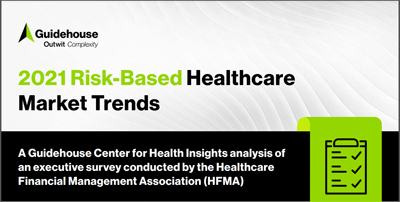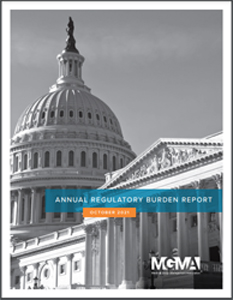A Trio of Value Based Care Surveys Indicate Technology Opportunities to Address Administrative Challenges
By Clive Riddle, November 10, 2021
The Guidehouse Center for Health Insights has just released analysis of an executive survey in conjunction with HFMA, the 2021 Risk-Based Healthcare Market Trends, that found health systems appear to be going big into risk sharing in 2022, with these percentages of respondents planning to advance into upside/downside risk sharing, professional capitation or global capitation for:
- Medicare Advantage: 59%
- Commercial Contracts: 52%
- CMS APMs: 49%
- Managed Medicaid: 36%
- Direct Employer Contracting 33%

Guidehouse's Richard Bajner tells us "We’re seeing increased interest from providers to own the premium dollar through risk-based arrangements. On the other hand, large payers have been more aggressive in building and even investing directly in primary care assets to gain control over the flow of care and better manage services delivered to members, compounding the need for payers and providers to align closely on market strategies. These moves have led health systems to gravitate toward programs more favorable for risk-based collaborations—or payvider models — such as Medicare Advantage, managed Medicaid, and self-insured models."
Guidehouse also share that “provider respondents to the survey cited data integrity, reporting, and the cost of technology (36%) as the No. 1 internal challenge in pursuing increased levels of risk. While half of respondents are building these capabilities in-house, 30% are partnering with payers to support risk-based capabilities and 21% are outsourcing services to a third-party organization.”

Avalere has just released their fifth annual outcomes based contract findings from a 50 question survey of 51 health plans and PBMs, indicating 56% have executed an outcomes based contract for prescription drugs. They also found 12% of payers reported having more than 10 OBCs currently in place, with another 6% of payers have 5–10 OBCs. This total 18% with 5+ OBCs decreased from 25% in 2020, although the portion with 10+ contracts increased from 2020.
Avalere’s Sarah Butler tells us “the significant increase in payers who have more than 10 OBCs in place is showing us that some payers are successfully executing these agreements. At the same time, however, the decline in payers that have tried 1 OBC indicates fewer new entrants in this space.”
Avalere reminds us that "OBCs typically include an agreement between health plans and drug or device manufacturers that ties product reimbursement to specific clinical, quality, or utilization outcomes. Although innovative contracting approaches, such as OBCs, aim to align cost with value, successful implementation and adjudication of an OBC or other type of value-based contract requires significant investment into infrastructure that can support outcomes tracking and coordination among entities involved. Therefore, while some payers may have successful experiences with OBCs, some payers may face significant administrative burden and have limited success in controlling costs."

Speaking of administrative burdens, the Medical Group Management Association (MGMA) recently released their 12-page Annual Regulatory Burden Report, finding that 91% felt the overall regulatory burden on their medical practice over the past 12 months has increased.
The Medicare Quality Payment Program (MIPS/APMs) ranked third (behind Prior Authorizations and COVID-19 workplace mandates) out of nine regulatory issues with regard to physician burden level, with 6% responding MIPS/APM were not burdensome; 6% slightly burdensome; 16% moderately burdensome; and 71% very or extremely burdensome. 79% said the move toward value-based payment (in Medicare/Medicaid) has increased the regulatory burden on their practice, and 70% said the program has not improved the quality of care for their patients, or been successful to date.
It should be noted survey responses were "from executives representing over 400 group practices. 70% of respondents are in practices with less than 20 physicians and 10% are in practices with over 100 physicians. Over 80% of respondents are in independent practices." Regulatory burdens might be anticipated to be greater with independent practices, and those with less than 20 doctors.
92% responded that CMS’ feedback was not actionable in assisting their practice in improving clinical outcomes or reducing healthcare cost related to the MIPS cost performance category, and 88% said the same for the MIPS quality performance category. 93% said positive payment adjustments do not cover the costs of time and resources spent preparing for and reporting under the program.
With respect to APMs, 80% said Medicare does not offer an Advanced APM that is clinically relevant to their practice, but 63% would be interested in participating in an Advanced APM if it was clinically relevant and aligned with their quality goals.
These findings would suggest an opportunity for value based care enabling applications that are designed to achieve program goals but also simplify participation and potentially reduce administrative burdens.
 Post a Comment By
Post a Comment By  Riddle, Clive |
Riddle, Clive |  Wednesday, November 10, 2021 at 03:25PM tagged
Wednesday, November 10, 2021 at 03:25PM tagged  Provider Payments|
Provider Payments|  Surveys & Reports|
Surveys & Reports|  health plans
health plans 

Reader Comments